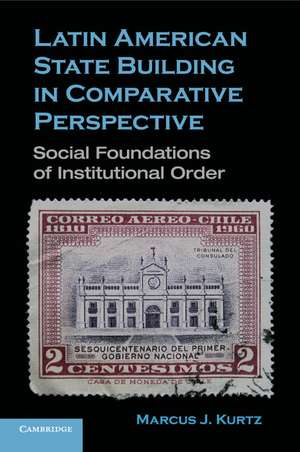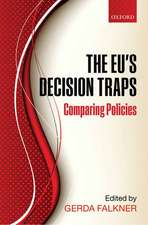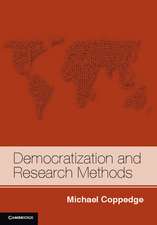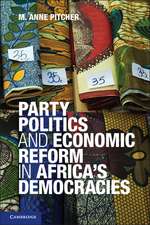Latin American State Building in Comparative Perspective: Social Foundations of Institutional Order
Autor Marcus J. Kurtzen Limba Engleză Paperback – 17 mar 2013
| Toate formatele și edițiile | Preț | Express |
|---|---|---|
| Paperback (1) | 260.91 lei 6-8 săpt. | |
| Cambridge University Press – 17 mar 2013 | 260.91 lei 6-8 săpt. | |
| Hardback (1) | 450.32 lei 6-8 săpt. | |
| Cambridge University Press – 24 mar 2013 | 450.32 lei 6-8 săpt. |
Preț: 260.91 lei
Nou
Puncte Express: 391
Preț estimativ în valută:
49.93€ • 51.99$ • 42.20£
49.93€ • 51.99$ • 42.20£
Carte tipărită la comandă
Livrare economică 10-24 martie
Preluare comenzi: 021 569.72.76
Specificații
ISBN-13: 9780521747318
ISBN-10: 0521747317
Pagini: 286
Ilustrații: black & white illustrations
Dimensiuni: 152 x 229 x 20 mm
Greutate: 0.39 kg
Ediția:New.
Editura: Cambridge University Press
Colecția Cambridge University Press
Locul publicării:New York, United States
ISBN-10: 0521747317
Pagini: 286
Ilustrații: black & white illustrations
Dimensiuni: 152 x 229 x 20 mm
Greutate: 0.39 kg
Ediția:New.
Editura: Cambridge University Press
Colecția Cambridge University Press
Locul publicării:New York, United States
Cuprins
1. The difficulties of state building; 2. The social foundations of state building in the contemporary era; 3. State formation in Chile and Peru: institution building and atrophy in unlikely settings; 4. State formation in Argentina and Uruguay: agrarian capitalism, elite conflict, and the construction of cooperation; 5. Divergence reinforced: the timing of political inclusion and state strength in Chile and Peru; 6. The social question and the state: mass mobilization, suffrage, and institutional development in Argentina and Uruguay; 7. Conclusions, implications, and extensions: social foundations, Germany/Prussia, and the limits of contemporary state building; Bibliography.
Recenzii
'Kurtz asks what has led some states to develop institutions capable of regulating the economic, political, and even social behavior of their citizens, while others have lagged behind. To answer this question, he relies upon a rich historical analysis of state-building efforts in Argentina, Chile, Peru, and Uraguay … He tests this theory this extensive data from paired comparisons of the polar opposite cases of Chile and Peru, as well as the more similar cases of Argentina and Uruguay. Summing up: recommended. Undergraduate, graduate, and research collections.' M. F. T. Malone, Choice
Notă biografică
Descriere
This book provides an account of long-run institutional development in Latin America that emphasizes the social and political foundations of state-building processes.














